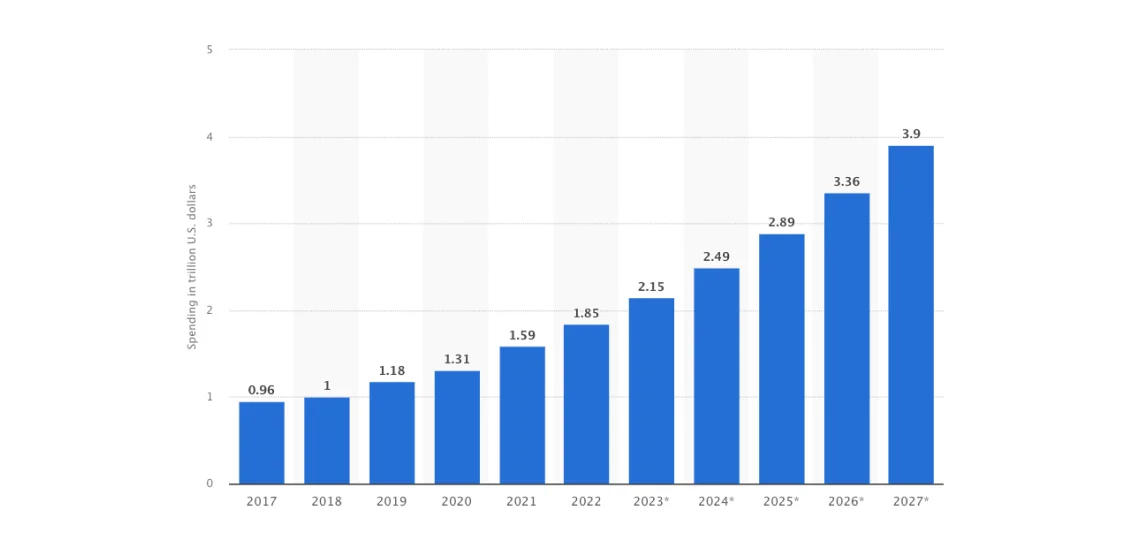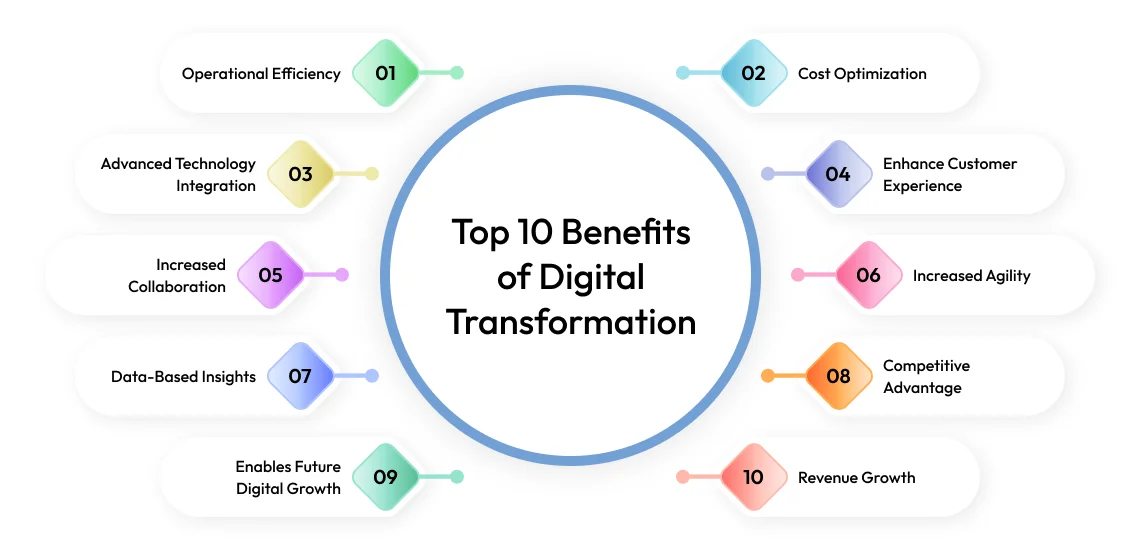What are the Key Benefits of Digital Transformation For Businesses?
- Business
- July 19, 2024
Digital transformation is the need of the hour in this digitally-driven world for businesses seeking competitive advantage and enhancing customer experiences. For a better understanding of why your business should consider implementing or investing in digital transformation, this blog post highlights the benefits of digital transformation in business, potential challenges, and more.
Businesses are undergoing a gradual evolution, with “staying relevant” being the driving force behind this shift. The underlying factors contributing to this evolution are many ranging from shifting customer behaviors and the explosion of data to the growing need for analytics, cybersecurity, and the adoption of advanced technologies (cloud computing, AI and ML, computer vision, and more), among others.
In terms of numbers, this shift has led to the global Digital Transformation (DX) market to soar to a staggering 2.15 trillion U.S. dollars—yes, trillion! And, the spending on DX is forecasted to reach 3.9 trillion U.S. dollars by 2027, according to a market overview by Statista.

Before exploring the various benefits that businesses seek from digitally transforming different aspects of their operations, let’s first understand what digital transformation means for a business.
What is Digital Transformation?
Digital transformation means making fundamental changes in how a business operates or delivers value to customers by leveraging the latest technologies across processes, operations, services, products, IT infrastructure, and more.
Businesses often adopt various digital transformation frameworks to implement a structured approach that has already proven effective in ensuring implementation success. Some such popular frameworks are:
- The DX Framework by Forrester
- McKinsey’s Digital Transformation Framework
- Gartner’s Digital Business Transformation Framework
To understand these Digital Transformation frameworks in detail, read our blog on How to choose the right digital transformation framework for your business.
Top 10 Benefits of Digital Transformation
With more and more businesses becoming a part of Industry 4.0, DX is becoming a conscious choice rather than something done just to keep up with the competition. Regardless of the reasons for which businesses opt for digital transformation, it is going to benefit them in multiple ways.

Here are some of the business benefits of digital transformation:
1. Operational Efficiency
One of the visible and far-reaching influences that digital transformation has on business organizations is accelerating the pace and efficiency of business operations with the help of digital tools. You have all the facts and figures at your fingertips and don’t have to invest much time in manual tasks, which proves to be time-saving.
Now, let’s understand this with an example. Suppose you are transforming the IT department of your organization. Here’s how digital transformation benefits operational efficiency::
- Implementing robotic process automation (RPA) can automate routine tasks like data entry, report generation, or system updates.
- Adopting end-to-end cloud computing solutions would enable businesses to gain scalability, flexibility, and cost-efficiency.
- Implementing a business intelligence (BI) dashboard can provide real-time analytics on key performance indicators (KPIs).
- Deploying AI-powered chatbots for customer support reduces response times and enhances user experience.
2. Cost Optimization
DX in businesses leads to automation, efficient resource utilization, supply chain optimization, and other such aspects that eventually contribute to cost reduction or optimization. Here is how DX leads to cost reduction:
- Automation leads to streamlined processes without the requirement of much labor, saving businesses labor costs, administrative costs, and any costs incurred from human errors.
- Migrating to cloud-based platforms enables businesses to eliminate the cost of maintaining costly on-premises servers, along with facilitating infrastructure scaling based on demand.
3. Advanced Technology Integration
With everyone going gaga over implementing some sort of advanced technology in their business operations, some businesses are unknowingly investing in DX without knowing about it through advanced technology integration.
Here’s how adopting new-age technologies as a part of digital transformation benefits businesses across various industries:
- A retail company can use AI/ML-powered solutions such as recommendation engines to analyze customer preferences and behaviors, offering personalized product recommendations.
- A startup can migrate to cloud-based platforms like Amazon Web Services (AWS) or Microsoft Azure to deploy and scale applications without the need for upfront investment in physical servers.
- An industrial manufacturer can install IoT sensors on its production equipment to monitor performance, predict equipment failures, detect anomalies in real-time, and schedule preventive maintenance.

4. Enhance Customer Experience
Nobody can understand the value of a customer better than a businessman, regardless of the industry! PwC, in one of their consumer intelligence series, mentions that about 59% of people in the U.S. will leave after a few bad experiences, even if they love the company or the product, and 17% will leave after just one bad experience.
Let’s take one such example where DX has been an exceptionally beneficial decision: retail businesses.
From customers visiting the store to making the store available wherever they are, 24/7, without the need for any assistance, from browsing items available in the store to personalized recommendations, to completing the purchase via convenient payment options – credit/debit cards, digital wallets, or buy-now-pay-later services, it shopping made easy for consumers. The statistic that retail e-commerce sales are estimated to exceed 6.3 trillion U.S. dollars worldwide in 2024 is an attestation of how DX has worked in favor of retail businesses.

And it doesn’t just end here; they can also track the order and get their queries answered through AI chatbots available for their assistance every minute of every day.
Ultimately, DX is, to a great extent, in industries like these, all about customer experiences!
5. Increased Collaboration
Enterprises that are yet to adopt digital transformation have one thing in common – SILOS!
Different organizational divisions operate independently, often isolated from each other, solely focused on their divisional priorities and objectives, without considering the broader goals of the organization or the needs of other departments.
This leads to a lack of communication, coordination, and efficiency. Consequently, duplicated efforts, inefficiencies, and missed opportunities arise.
Here is how digital transformation helps break down silos within enterprises:
- Facilitate cross-departmental collaboration and data sharing through platforms and tools like enterprise resource planning (ERP), supply chain management apps, and more.
- Centralizing data management systems, such as implementing a customer relationship management (CRM) system, allows teams to have a holistic view.
- Project management software, communication platforms, and virtual collaboration tools can facilitate real-time communication and collaboration among different teams and departments.
- A dashboard visualizing data based on analysis from different departments and functions can be leveraged for data-driven decisions.
- Implementing robotic process automation (RPA) automates repetitive tasks across departments.
Must Read: The Important Elements of the digital transformation Before its Implementation
6. Increased Agility
In this fast-paced, digitally driven world, businesses with the ability to adapt and respond quickly to changes tend to survive. By digitizing and automating manual processes, businesses can eliminate bottlenecks and reduce time-to-market for products and services. This agility allows them to respond quickly to market changes and customer demands.
Having a cloud-based infrastructure would enable businesses to scale resources up or down based on demand, enabling them to adapt to changing business needs rapidly, among other benefits.
Overall, digital transformation enhances a business’s agility by streamlining processes, leveraging flexible infrastructure, enabling remote work, fostering data-driven decision-making, adopting agile development practices, focusing on customer needs, and more.
7. Data-Based Insights
Most digital transformation strategies involve application development, whether mobile or web, resulting in the accumulation of a vast amount of data that businesses can leverage for not just real-time accessibility but also visualize these datasets through intuitive charts, graphs, and dashboards.
By implementing advanced analytics techniques, such as machine learning and predictive analytics, businesses can analyze their data to uncover valuable insights. This includes descriptive analytics to understand what has happened, diagnostic analytics to determine why it happened, predictive analytics to forecast future trends, and prescriptive analytics to recommend actions.
Upon analyzing customer data, businesses can gain insights into individual preferences, behaviors, and needs. This enables them to personalize their products, services, and marketing efforts, leading to better customer engagement and satisfaction.
8. Competitive Advantage
Each of the above benefits of digital business comes with a competitive advantage for businesses. For example, operational efficiency—once the business starts operating more efficiently, the impact can be seen substantially in minor aspects to major ones, such as responding to customer needs faster and adapting to market changes more effectively than their competitors.
Further, with the adoption of advanced technologies like AI, IoT, and cloud computing, businesses gain the competitive advantage of having unique offerings that differentiate them from competitors.
To explore how some of the business giants leveraged these technologies for their digital transformation initiatives, check out our blog on 7 examples of digital transformation.
9. Enables Future Digital Growth
Whether it is operational efficiency, adoption of advanced technologies, a customer-centric approach, or any of the above benefits of digitalization in business, DX lays the groundwork for future digital growth, especially in terms of scalability.
Let’s take the use case of a retail business. Once they have eCommerce app development as part of their digital transformation initiative, upon gaining a positive impact from it, the business can now work further to level up the customer experience to another level. This could be the implementation of AR and VR technologies, allowing their customers to have an interactive product demonstration or even virtually try the product on, making the entire shopping experience more immersive and providing a solid key differentiator for themselves in the marketplace.
In terms of scalability, explore how our team assisted Malaysian multinational airline – AirAsia, who approached us seeking our expertise to future-proof their app by optimizing its architecture to handle anticipated surges in user traffic.
10. Revenue Growth
Apart from cost efficiency and optimization through automation and various other tech-based systems in place, DX opens up opportunities for businesses to monetize their existing assets or tap into new markets.
For example, deploying a customer relationship management (CRM) system integrated with data analytics capabilities can help businesses better understand customer preferences and behavior, allowing them to tailor their products and services accordingly. This personalized approach can lead to advantages of digital transformation such as increased customer retention and repeat purchases, ultimately driving revenue growth.
Read also: How to Find the Best Digital Transformation Partner?
Challenges Businesses Face When Implementing Digital Transformation
While there are numerous benefits of digital transformation in business, it also faces roadblocks when it comes to implementing digital transformation strategies. Here are some challenges that businesses are likely to face during their digital transformation journey:
- Legacy systems
- Security concerns
- Complex software and technology
- Lack of a digital transformation strategy
- Budget constraints
- Isolated organizational structure
- Digital skill gaps
- Lack of resource availability
- Complex regulatory frameworks
- Inefficient data management and scalability
To explore these challenges in detail and discover solutions to overcome them, read this blog on 10 Challenges in Digital Transformation and How to Overcome Them.
Accelerate Your Business Growth with MindInventory’s Digital Transformation Solutions
We are a reputed digital transformation company that has been assisting global clients from various industries with their digitization requirements, from business strategy transformation to digital innovation.
Our experienced tech team empowers businesses to achieve their varied goals, including enhanced operational efficiency, improved customer experience, global reach, market expansion, better quality deliverables, and more.
You can opt for a dedicated development team with extensive expertise in the latest technologies to implement various development aspects, from full-cycle app development to AI/ML development, application development, and more.
If you’re planning a digital transformation for your business and need a technical partner to bring your vision to life, contact our team to discuss your requirements.
FAQs on Digital Transformation
The key objectives of digital transformation include improving customer experience, enhancing operational efficiency, driving innovation, data-driven decision-making, ensuring scalability, fostering collaboration, enhancing security, reducing costs, and gaining a competitive advantage. These objectives collectively contribute to a business’s success and adaptability in the digital age.
Digital transformation (DX) is not a one-size-fits-all solution. It is more of a continuous journey of improving and adapting the latest technology to achieve business objectives. However, the duration can vary depending on company size, transformation complexity, digital maturity, transformation scope, available resources, and more.
While digital transformation is an ongoing journey, several strategies can accelerate its pace. These include adopting agile methodologies, prioritizing digital initiatives, leveraging cloud-based solutions, implementing automation, upskilling the workforce, and more.
Digital transformation is a complex process that typically doesn’t yield immediate results. However, there are key metrics you can track to gauge its impact. These include business performance indicators such as sales and costs, customer engagement metrics like retention rates and Net Promoter Score (NPS), operational efficiency measures such as time-to-market and processing times, and more.







